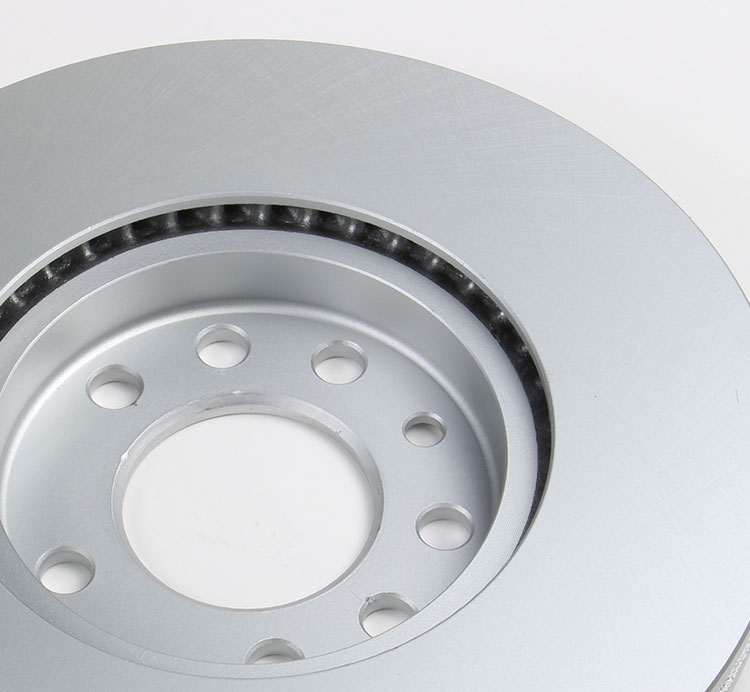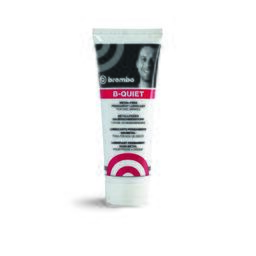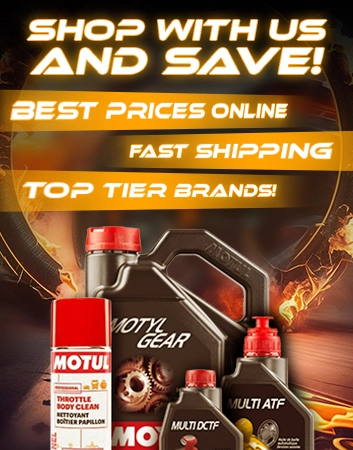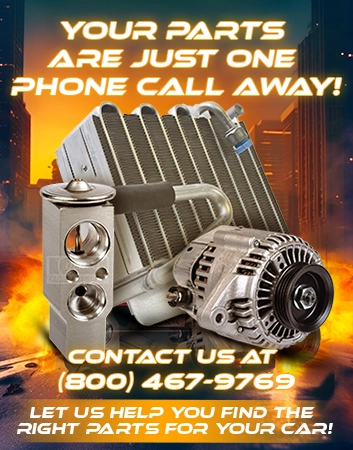Brake Pad Squeal can ruin an otherwise comfortable ride. Pulling up to the stoplight with horribly squeaking brakes draws attention, and is extremely annoying. If you are here, you may be wondering what the deal is, and luckily I have an answer for you. There are a few ways to reduce brake pad squeak, and they are quite simple. Engineers have been working to reduce squeaky brakes for a while, so if you have brake pad squeal don’t worry it’s completely natural (and annoying).
What Causes Brake Pad Squeal
Brake pad squeal is the result of what Porsche describes as “Stick-Slip”, which is pretty self-explanatory. When the brake pad comes into contact with the rotor the whole point is to generate friction. It is not because you need brakes. For a variety of reasons, this friction isn’t completely smooth. Imagine taking an open palm and dragging it across a pane of glass. It will stick, and slip. The back and forth frequency of the pad and rotor result in a high-frequency squeal, and the sound is amplified through the large metallic surface that is the brake rotor.
 On floating calipers, there is generally one piston on one side of the brake rotor. The caliper slides along a pair of greased pins, which is why they call it floating. This design is able to absorb vibrations to some degree. On a fixed caliper, there are pistons on both sides of the rotor and the caliper is mounted solidly. Many performance brakes feature the fixed design as it is a little more sturdy and provides good feedback.
On floating calipers, there is generally one piston on one side of the brake rotor. The caliper slides along a pair of greased pins, which is why they call it floating. This design is able to absorb vibrations to some degree. On a fixed caliper, there are pistons on both sides of the rotor and the caliper is mounted solidly. Many performance brakes feature the fixed design as it is a little more sturdy and provides good feedback.
You will see fixed rotors on sports cars, and heavy performance-oriented vehicles like Porsches and BMW M cars, and if you’ve ever done the brakes one a luxury car with fixed calipers you will notice that the pads often come with small metal attachments. These are called damping weights and work to dull the vibrations in a specific frequency range. Without the addition of damping weights, or the isolation from the pins and associated bushings on a floating caliper, these braking systems can be very noisy. Most of the time these types of systems are reserved for racing-oriented cars.
It’s an extremely common misconception that when your brakes start squealing, you need to replace them.
This is Wrong.
Even though we love selling brake kits to the uninformed, the more realistic reason your brakes are squealing now and didn’t before is that the anti-squeal shim has been compressed, and the anti-squeal grease has washed off. Many brake pads have a small metal hook on them meant to rub on the rotor when they are worn beyond spec, but they are designed to only squeak when you are in reverse (if the pad is installed correctly). Kind of an audible wear indicator. Another reason for squealing brakes that really need to be replaced is if your pad is completely gone, and you are stopping your vehicle with the metal backing plate. Here are the two ways you can easily fix your noisy brakes.
Re-grease Your Brake Pads
In almost every case, your brake pads will come with a small tube of grease. This grease should go in two places, the back of the pads on the shims (avoid the actual material at all cost), and the caliper slide pins if they are of the floating variety discussed above. Some people also apply a thin layer of grease on the edges of the brake pad backing plate where it contacts the caliper carrier bracket and any other metal to metal contact. As a general rule of thumb, anywhere the caliper touches the pad backing plate. A dab’ll do yah, as they say in Boston. Friction surfaces and grease don’t mix, so go easy on the grease and don’t let it touch the rotor or pad material.
By applying a thin layer of grease to the back of the bad where it contacts the caliper, you are helping provide a complete and smooth connection that will dampen any high-frequency vibrations you may encounter.
Re-shim your pads
Although it’s rare, sometimes your shims can fall out or tear. If this is the case you should first check your brakes for any issues that may have caused this situation. If everything looks good, you can get new shims that provide a thin buffer between the caliper and the pad.
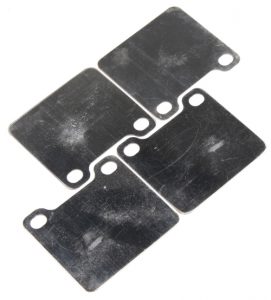
In conjunction with the previously mentioned grease, this is just enough to dampen the super high-frequency squeal that brakes emit naturally. You can also replace your brake pad damper weights along with the shims if your brakes are set up that way if you lost one for whatever reason. We have yet to see a brake pad require new weights on anything other than a Porsche.
Cases Where This Won’t Work
There are of course a few instances where applying grease to the brake pad backing plates or shimming the pads won’t work. If your brake pads are worn down to the backing plates, then your brakes will make a horrible squealing/grinding noise. This happens from time to time in endurance racing, I can’t recommend it. Speaking of which, if you are racing and are using performance brake pads, you will inevitably have squeaky brakes.
It’s the nature of the beast, as higher heat/harder compound friction material induces high-frequency vibration much easier. Along the same lines, if you are thrashing your brakes so hard you over-heat them, they can glaze. Glazed brakes are caused by the friction material getting so hot the surface changes like a ceramic pot in a kiln. The new surface generates much less friction and is much harder. Like racing pads, the harder, lower friction surfaces are much more likely to be really squeaky.
In all of these situations, you are much better just buying new brakes. Luckily, we carry a variety of brake parts and kits from Aftermarket, OE, and Performance applications. Since brakes generally aren’t too expensive, replacing them with new couldn’t hurt. If you’re not sure about the type of brake pads or lubricants you should buy, our customer support technicians are standing by to answer all of your questions.

